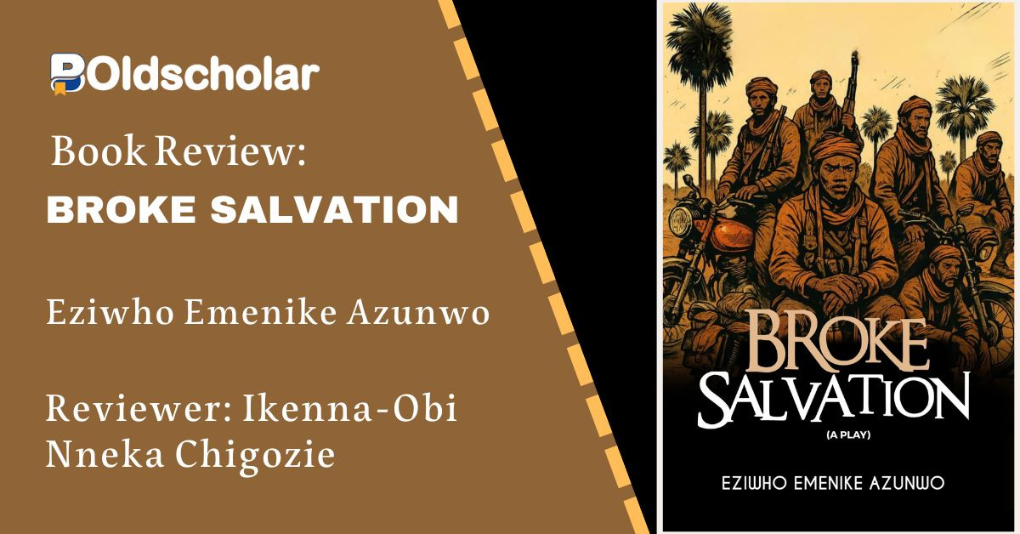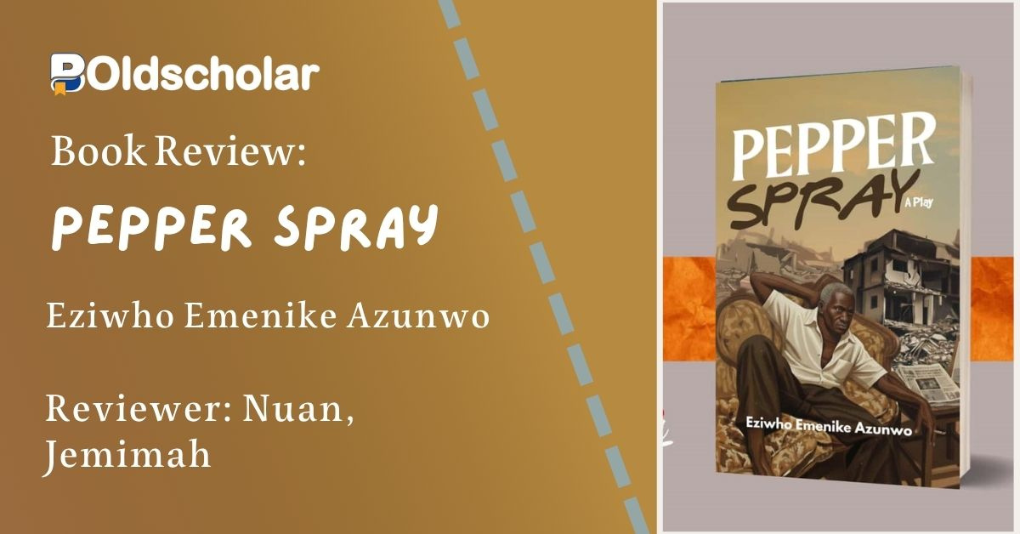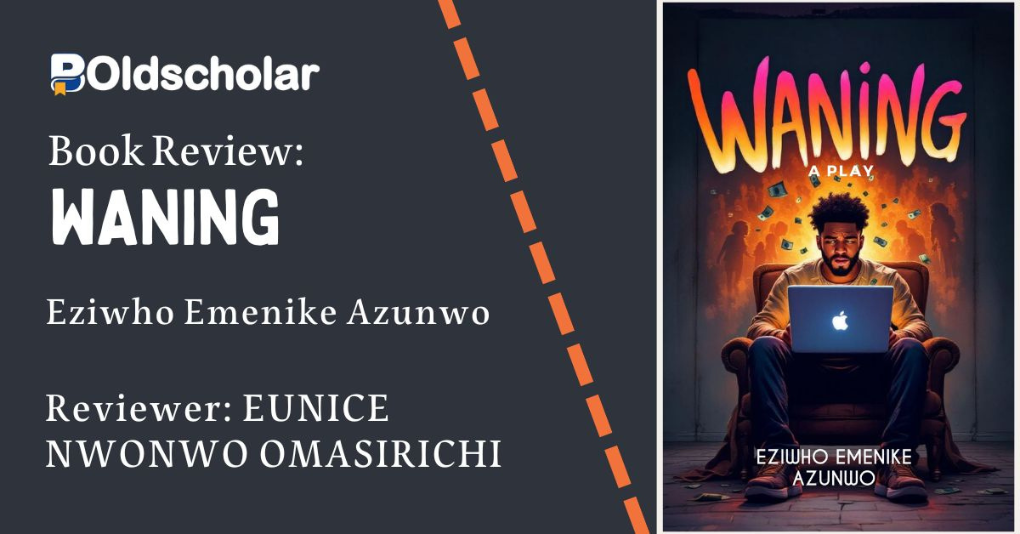A Review of Eziwho Emenike Azunwo’s play
Title: Broke Salvation
Genre: Play (Tragedy)
Author: Eziwho Emenike Azunwo
Year of Publication: 2025
Publisher: Covenant Daystar Publishers, Port Harcourt. Nigeria
Pagination: (Number of pages) 70 pages
Reviewer: Ikenna-Obi Nneka Chigozie
Institution: Rivers State University, Port Harcourt, Department of Theatre and Film Studies
Introduction
Eziwho Emenike Azunwo’s Broke Salvation is a contemporary Nigerian political tragedy that dramatizes the vicious intersection between terror, betrayal, and compromised leadership.
The play is set in a fictional, violence-ravaged community plagued by systemic decay, militarized terror, and complicit governance. Through sharply drawn characters and chilling scenes of brutality, Azunwo presents a society in which hope is constantly negotiated, often at the expense of justice and dignity. Written with visceral urgency, the play contributes meaningfully to the postcolonial African dramatic tradition, echoing the political moralism of writers such as Ngũgĩ wa Thiong’o and Femi Osofisan.
Eziwho Emenike Azunwo’s Broke Salvation is a searing political tragedy that captures the terrifying fragility of leadership and morality in a community besieged by terror. Set in a fictional Northern Nigerian village plagued by insurgency, betrayal, and silence, the play dramatizes the implosion of civic trust in the face of corrupt leadership and institutional decay. At its core, Broke Salvation interrogates what happens when the people tasked with protecting a community instead become co-conspirators in its destruction. The play’s thematic concerns— state complicity, moral paralysis, and weaponized diplomacy—are presented through a brutally honest narrative and sharply etched characters. As the author makes clear in his Author’s Note, the play is “a cry. A warning. And a call” for collective reckoning and transformative justice
Plot Analysis
Eziwho Emenike Azunwo’s Broke Salvation is structured into six increasingly harrowing scenes, each revealing the slow political, psychological, and moral collapse of a community strangled by fear, betrayal, and silence. The plot follows a classical tragic arc, but Azunwo subverts the genre by replacing fate with corruption and collusion as the engines of destruction. Each scene strips away illusions of salvation, revealing instead a grotesque performance of diplomacy where peace is bought with complicity and justice is sacrificed on the altar of self-preservation.
Scene One (pp. 11–23): Terror as Overture
The play opens with one of the most chilling domestic invasions in African drama. Scene One begins in the home of Danjuma, a farmer and family man, whose household is besieged by Coco- ma, the brutal bandit commander, and his masked men. The dialogue begins with a disturbing calm:
COCO-MA: “So, what do you have for us?” DANJUMA: “Sir… I have nothing…” (p. 12)
Coco-ma, interpreting this as deceit or defiance, orders his men to stab Danjuma’s son in front of
the family:
“(One of the masked men pulls out a dagger, walks over to Danjuma’s son, and stabs him viciously. The boy screams… and breathes his last.)” (p. 14)
The violence intensifies when Wife 1 resists being taken by force:
WIFE 1: “Over my dead body! I would rather die!”
‘(A sudden gunshot erupts. Wife 1 falls lifelessly. Blood gushes from her mouth.)” (p. 17)
Later, Danjuma’s young daughter is dragged backstage by one of the bandits. When she returns,
traumatized and bloodied, the family collapses emotionally:
“(Blood trails down her legs. She staggers with her sisters and they embrace her. Tears
overwhelm the stage.)” (p. 19)
Coco-ma orders the family set on fire, declaring:
COCO-MA: “Even if you bring out the money, I’ll still kill you myself.” (p. 21)
COCO-MA: “La ilaha illallah, Muhammadur Rasulullah…” (p. 22)
The lights fade as he strikes a match. This opening act establishes the unfiltered horror of unaccountable power and the deliberate use of violence to instill fear and establish control. Scene Two (pp. 24–33): The Council of Cowards
The second scene shifts to the sitting room of the Community Leader (Sarki), where elders have gathered to discuss the recent atrocities. The tension is no less palpable, as fear, paralysis, and hypocrisy take center stage
.Bello articulates the community’s collective helplessness:
BELLO: “People die daily like birds—and it’s becoming normal…” (p. 25)
Ahmed, a young and courageous villager, emerges as the only voice of dissent. He directly confronts the leader:
AHMED: “Your farm, which sits next to ours, is never touched. Not once. Should we be suspicious?” (p. 28)
This accusation sets the stage for the major political revelation to come. Ahmed’s refusal to be silenced, even as the elders urge restraint, suggests that truth-telling itself has become dangerous. Scene Three (pp. 34–44): Unholy Alliances
This act moves into Coco-ma’s hideout, where the unthinkable becomes visible: the Community
Leader and Coco-ma are secret allies.
Their conversation is shockingly casual. They greet each other with “As-salamu Alaikum” (p.
35), and Coco-ma offers refreshments and money:
COCO-MA: “This is for you… A good man like you should at least have a share of your kindness.” (p. 41)
The Leader confirms that he has been chosen to meet government forces:
LEADER: “I’ve been chosen to go to town and discuss the plan to bring government men to the village.” (p. 37)
Coco-ma, who reads newspapers and speaks English fluently, mocks the idea that he is a mindless criminal. He complains:
COCO-MA: “They’re calling me and my men bandits. Is that fair?” (p. 38)
He suggests negotiation—but on his own terms. The Leader promises to relay this to the General. This scene confirms the play’s central argument: power, in this world, is no longer morality is transactional.
Scene Four (pp. 45–53): Government Complicity
At a security meeting with General Gada, the Leader proposes the shocking idea: negotiate with the bandits.
LEADER: “I think we should negotiate with these bandits…” (p. 48)
The elders react with outrage: “God forbid!” Yet the General nods in agreement: GADA: “There is some sense in that…” (p. 49)
He justifies this position with chilling logic:
GADA: “If we use military force… many of your relatives will be caught in the crossfire.” (p.
52)
The state’s unwillingness to act decisively against the terrorists is exposed here. Rather than pursue justice, the military prefers appeasement. In a bitter twist, the suggestion to use negotiation as bait to trap the terrorists is shut down by the same General:
GADA: “Are you now a military officer?” (p. 50)
This scene illustrates how the military has become morally indistinguishable from the bandits they are meant to defeat.
Scene Five (pp. 54–62): Terror as Business
Back at Coco-ma’s hideout, the victims are now kidnap hostages. Among them is Richard, a southern youth. When his ransom is delayed, he is executed without hesitation: “(Snaps his fingers. A loud blast erupts. Richard drops dead instantly.)” (p. 57) Shortly after, the Leader arrives again with news that the General is open to negotiations.
Coco-ma issues a threat:
COCO-MA: “If I come there and anything funny happens… the whole community will be burned down, and not even your house will be spared.” (p. 60)
In return for loyalty, Coco-ma gifts the Leader with a bag of cash. Once again, violence becomes an economic exchange. The Leader smiles. They feast. And prepare for the final performance: the public peace talk.
Scene Six (pp. 63–70): The Peace of the Damned
This is the climax and resolution. A public “peace dialogue” is staged. Villagers gather.
The Leader smiles. The General gives a rousing address:
GADA: “Today is a significant day for this community—a Day of Reconciliation… a day of cooperation and harmony.” (p. 64)
Ahmed, true to character, rises in protest:
AHMED: “Who are you having this peace dialogue with? The man who has killed, destroyed, and taken the lives of children in their sleep?” (p. 66)
Coco-ma, enraged, guns Ahmed down in full view of the community: “(A loud blast erupts on stage as Coco-ma guns down Ahmed.)” (p. 69) The General’s response is a chilling eulogy of cowardice:
GADA: “The man died out of his own arrogance.” (p. 69)
Applause follows—not for the slain youth, but for the bandit. Coco-ma delivers his “peace terms”:
COCO-MA: “We want monthly remittance of all farm produce by 20%, monthly fueling for our bikes and maintenance, fine girls to marry our men, and five cows each month.” (p. 70)
The Leader nods:
LEADER: “I will make sure we do everything in our capacity to meet them.” (p. 70)
The lights fade. The drums thunder. The curtain falls.
What remains is not peace, but an elegantly staged surrender. Final Reflection
Each act of Broke Salvation builds upon the last to construct a political allegory of betrayal. From a blood-soaked living room to the halls of failed authority, from secret hideouts to public appeasement, the plot unravels not just a community, but a nation’s soul. Ahmed’s death is not just symbolic—it is judicial. He is the only character who speaks truth without fear. In killing him, the state and the terrorists jointly declare that truth has no place in their version of peace.
Azunwo’s genius lies not only in portraying this with dramatic power, but in making the audience complicit. The applause at the end mirrors a society that has chosen comfort over justice, submission over resistance.
Characterization
The characters in Broke Salvation are more than individuals—they are vehicles through which Eziwho Emenike Azunwo dramatizes the ethical collapse of a society trapped between terror and compromise. Each major figure represents a moral or institutional force: terrorism, corruption, resistance, complicity, or cowardice. Azunwo develops his characters not as abstract archetypes, but as painfully recognizable actors within a broken socio-political order. Their dialogue and actions reveal the fractures in governance, morality, and public conscience.
Coco-ma: The Face of Armed Impunity
Coco-ma, the ruthless bandit leader, is the most terrifying character in the play—not simply because of his violence, but because of his calculated reasoning and charismatic control. He is not portrayed as a one-dimensional villain but as a disturbingly articulate agent of chaos. He enters in Scene One with masked men, terrorizing Danjuma’s household with the demeanor of someone performing routine duties rather than atrocities. When Danjuma pleads ignorance, Coco-ma responds coldly:
COCO-MA: “So where is my share of your sales?” (p. 12)
When Danjuma’s son is murdered and Wife 1 begs for her life, Coco-ma replies: COCO-MA: “She will be going with me.”
WIFE 1: “Over my dead body!” “(A sudden gunshot erupts. Wife 1 falls lifelessly…)” (pp. 16–17)
Coco-ma’s language frequently invokes religious and political justification for his actions. He recites Islamic prayers over the burning corpses of the family he has just executed (p. 22), and later declares to Richard and other kidnap victims:
COCO-MA: “We are here for business, and we don’t take jokes or delays.” (p.57) His disdain for the state is evident when he mocks the media for labeling him a bandit: COCO-MA: “They’re calling me and my men bandits. Is that fair?” (p.38) Yet beneath this bravado lies a deeper agenda: not simply destruction, but legitimization through fear and negotiation. His final demands at the peace meeting— “20% of all farm produce, monthly fueling, fine girls, and five cows” (p. 70)—reflect his desire to formalize his authority. Coco-ma is a militant warlord turned political stakeholder, and Azunwo uses his character to expose how power often rewards those most willing to destroy others
The Community Leader (Sarki): Political Duplicity Embodied
The Community Leader, also referred to as Sarki, is one of the most complex and damning characters in the play. On the surface, he appears to be a figure of concern and order, calling elders to discuss the plight of the people. But underneath this facade is a man deeply entangled in betrayal. In Scene Two, he downplays the fear of the villagers while silently aligning with the very source of their suffering.
Ahmed’s pointed interrogation strips away his veneer:
AHMED: “Your farm, which sits next to ours, is never touched. Not once. Should we be suspicious?” (p.
28)
The suspicion is confirmed in Scene Three when Sarki meets Coco-ma in secret: COCO-MA: “You are welcome, my brother.”
LEADER: “Thank you… how are you?” (p. 35)
Coco-ma even questions the Leader’s sincerity:
COCO-MA: “Hope you didn’t come here to insult my intelligence.” (p. 42)
Despite the Leader’s discomfort, he accepts money and promises to facilitate negotiations. In Scene Six, he welcomes Coco-ma at the peace gathering with public enthusiasm: LEADER: “Our dear friend who is here today in our midst. You are welcome.” (p. 63) After Coco-ma murders Ahmed, the Leader makes no protest. Instead, he promises to meet the bandit’s demands:
LEADER: “I will make sure we do everything in our capacity to meet them.” (p. 70)
Through this character, Azunwo illustrates how local elites can become brokers of terror, packaging surrender as diplomacy. The Leader is not merely complicit—he is morally bankrupt, willing to trade justice for influence, and public safety for private gain. General Gada: The State’s Hollow Voice
General Gada, the top-ranking military officer, functions as the play’s embodiment of state-level moral failure and bureaucratic detachment. Though expected to restore order, he instead becomes an agent of appeasement.
In Scene Four, he surprises the elders when he agrees to negotiate with the terrorists:
GADA: “There is some sense in that…” (p. 49)
He justifies this with bureaucratic coldness:
GADA: “If we use military force… many of your relatives will be caught in the crossfire.” (p. 52) Later, when Ahmed is executed in his presence, the General responds not with action but with indifference:
GADA: “The man died out of his own arrogance.” (p. 69)
General Gada is chilling not because he is overtly cruel, but because he represents institutional collapse under the weight of convenience. His presence at the peace meeting, handshake with Coco-ma, and failure to protect civilians all point to a government that has lost its moral compass. In him, Azunwo paints a portrait of a state that has chosen accommodation over accountability. Ahmed: The Tragic Conscience
Ahmed is the play’s tragic hero and moral compass, the only character who consistently tells the truth regardless of personal cost. From his first appearance, he challenges the elders’ complacency and Sarki’s hypocrisy:
AHMED: “What kind of man hears the loud cry of his neighbor and does nothing?” (p. 27)
He accuses Sarki of corruption with fearless directness:
AHMED: “When a dog meant to chase off intruders starts wagging its tail instead, then we question what deal the dog has made…” (p. 28)
In Scene Six, at the peace dialogue, he makes a final plea for conscience and justice:
AHMED: “Let me remind you this very room you created for peace will birth more monsters than you can ever imagine.” (p. 68)
Moments later, he is gunned down by Coco-ma, a martyr to truth in a society that no longer values it. His murder is symbolic of the death of resistance, youth, and voice in a land where negotiation with terror is celebrated.
Ahmed’s death redefines the entire structure of the play as a moral tragedy. His final line before the gunshot— “I know you have children, and they will one day sit to eat with bandits…” (p. 69)—functions as a prophecy. In his character, Azunwo encapsulates both the cost of courage and the consequence of communal cowardice.
The Elders: The Chorus of Compromise
The village elders operate as a collective character—the voice of fear, weariness, and moral surrender. At several points in the play, they express concern for their people, but never the courage to act. They criticize Ahmed’s outbursts more than the terrorists’ atrocities. When Ahmed speaks up at the peace meeting, an elder scold him:
ELDER: “You’re going too far.” (p. 31)
Even after his death, they remain passive. Their silence is not just weakness, it is complicity. Azunwo uses the elders to reflect how a society, worn down by fear and survival, can become its own enabler of evil. In Broke Salvation, character is destiny—but not in the classical tragic sense. Here, destiny is shaped not by divine forces but by the choices made by leaders, institutions, and communities. Azunwo’s characters are painfully believable, rooted in contemporary Nigeria’s social and political realities. Through Coco-ma, the Leader, the General, Ahmed, and the voiceless masses, Azunwo reveals the human faces behind institutional failure—and reminds us that when heroes are killed and villains are applauded, salvation itself becomes broken.
Thematic Concerns
Eziwho Emenike Azunwo’s Broke Salvation is a deeply layered political tragedy that explores the intersection of terror, betrayal, and institutional decay in contemporary African society. Its thematic structure mirrors the escalating structure of the plot: as each scene intensifies in action, so too do the moral and ideological questions it raises. Beneath the surface narrative of negotiation and survival, the play interrogates foundational questions about governance, complicity, violence, and truth in a nation at war with itself.
The play’s dominant themes revolve around the illusion of peace, the normalization of evil, the silencing of dissent, and the complicity of institutions in violence. By positioning these themes within a starkly Nigerian context, Azunwo offers a searing indictment of postcolonial power and the moral compromises that define it.
Peace as Political Performance
At the heart of Broke Salvation is a disturbing critique of what Azunwo calls a “broken peace”— a so-called salvation that is not redemptive but transactional, corrupted, and dangerous. The title itself is a thematic assertion: “salvation” is promised, but it arrives mutilated, bought through silence and violence. As Azunwo notes in his Author’s Note, “salvation, when pursued through crooked means, comes broken, unholy, tainted, and often more dangerous than the chaos it intends to cure.”
This critique is most explicitly dramatized in Scene Six, during the so-called peace meeting. The terrorist leader Coco-ma is welcomed not with handcuffs, but with applause. The Leader calls it “a Day of Reconciliation” (p. 64), while the General labels it “a day of cooperation and harmony” (p. 65). Yet the terms of peace are grotesque: 20% of all farm produce, women, fuel, and cattle (p. 70). The people’s salvation is bartered like a commodity—without justice, reparation, or accountability. Ahmed, the play’s moral voice, warns of the consequences of such a hollow peace: AHMED: “Let me remind you, this very room you created for peace will birth more monsters than you can ever imagine.” (p. 68)
His death moments later is a haunting confirmation: peace without justice is a prelude to deeper tyranny.
The Normalization of Violence
One of the most striking themes in Broke Salvation is the domestication of terror. Violence, though shocking in the first scene, quickly becomes mundane to the community—and even justified by its leaders. The transition from horror to habit is embodied in the elders’ passivity and the Leader’s calm dealings with terrorists.
This normalization is captured in Bello’s remark during the council in Scene Two: BELLO: “People die daily like birds—and it’s becoming normal…” (p. 25)
By embedding such language in everyday dialogue, Azunwo emphasizes how societies can become numb to atrocity. The audience watches as brutality is negotiated, explained, even spiritualized. Coco-ma’s recitation of Islamic prayer while burning a family alive (p. 22) and his polished English monologues reflect the rhetorical sophistication of terror—violence framed as divine will or economic order.
This theme is intensified by the General’s refusal to act. In Scene Four, he justifies negotiation because military force might “catch relatives in the crossfire” (p. 52). The implication is chilling: the cost of justice is too high, so injustice is permitted to thrive.
Complicity of Power and Institutions
Broke Salvation is relentless in exposing how those entrusted with protecting the people are themselves entangled in betrayal. Azunwo dramatizes a political ecosystem where terror is not an external force but a product of internal decay. The Leader, for instance, plays both savior and saboteur. In Scene Three, he receives a bribe from Coco-ma and affirms loyalty:
COCO-MA: “This is for you… A good man like you should at least have a share of your kindness.”
LEADER: “I’ll present this at the meeting and report back to you.” (p. 41)
This is not isolated villainy but an institutional pattern. The General’s alignment with the terrorists further demonstrates how national institutions have abandoned their ethical responsibilities. After Ahmed’s murder, the General offers no condemnation:
GADA: “The man died out of his own arrogance.” (p. 69)
The military, traditionally the last line of defense, becomes the final layer of betrayal. The play suggests that the line between criminal and official has blurred so thoroughly that the community no longer knows who governs them—and who preys on them.
Silencing of Dissent
Truth is dangerous in Broke Salvation, and those who speak it rarely survive. This theme is embodied in Ahmed, the only character who refuses to normalize the terror or excuse the leaders. From his first appearance, he questions the political double-dealing of Sarki: AHMED: “Your farm, which sits next to ours, is never touched. Not once. Should we be suspicious?” (p. 28)
Ahmed’s arc is a tragedy of moral clarity. He speaks truth to power at every stage—accusing the Leader, warning the people, and confronting Coco-ma. His death in Scene Six is not just dramatic climax—it is thematic culmination:
AHMED: “I know you have children, and they will one day sit to eat with bandits.” (p. 69) The bullet that silences him is also aimed at conscience. His execution on stage, applauded by the same leaders who brought the terrorist to the dialogue table, represents the destruction of resistance in a society ruled by fear and deals.
Gender, Silence, and Sacrifice
Though not foregrounded, the play’s portrayal of women speaks to a theme of silent suffering and systemic erasure. The most brutal violence in Scene One is inflicted on women: a mother is shot dead for resisting, and a daughter is raped and returned broken. Her trauma is left without comment. No justice is sought. In Scene Six, Coco-ma demands “fine girls to marry our men” (p. 70), and the Leader agrees.
Women, then, are not only victims—they are currency in negotiations of power. Their pain is never addressed, only absorbed into a transactional political system. Azunwo uses this silence as a metaphor: just as the community refuses to avenge Ahmed, it refuses to remember or name what was done to its daughters.
The Death of Collective Conscience
Perhaps the most pervasive theme in the play is moral collapse as a communal condition. It is not only leaders who are corrupt are the elders who are passive, the General who is indifferent, the villagers who are silent. At the end, even after Ahmed’s murder, the audience watches in stunned silence as Coco-ma outlines his demands and is celebrated as a brother. The final image of the play—drums rolling, applause echoing, killers shaking hands—embodies the ultimate question:
What is the cost of survival if it requires the death of truth?
Azunwo leaves his audience with no comfort. The community has not been saved—it has been pacified. The title Broke Salvation is not merely metaphor— it is diagnosis. The themes of Broke Salvation are not abstractions—they are rooted in lived realities of contemporary Nigerian society: insurgency, state failure, elite collusion, and communal fatigue. Through incisive dialogue, symbolic action, and brutal realism, Azunwo critiques not only the terrorist but the ecosystem that sustains and protects him.
At its core, the play is a theological and political warning: where truth is silenced, where peace is purchased without justice, where fear replaces resistance—there, salvation will always be broken.
References
Azunwo, E. E. (2025). Broke salvation: A play. Covenant Daystar Publishers
Share this post





Be the first to comment on this post